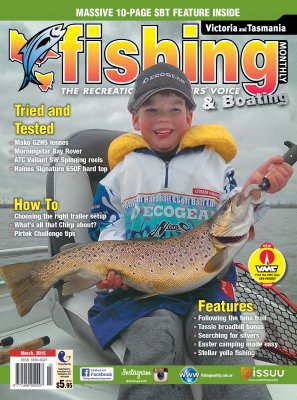Stellar yella facts by Robbie Alexander
 Yellowbelly, also known as golden perch, and known in South Australia as callop are one of the most popular species of native fish in Victoria's freshwater waterways.
Yellowbelly, also known as golden perch, and known in South Australia as callop are one of the most popular species of native fish in Victoria's freshwater waterways.
They are probably the second most popular species of native freshwater fish in Victoria behind the Murray cod, whose popularity overshadows all other species due to its iconic status and large size.
STOCKING
In terms of fish stocking, yellowbelly blow all other species off the track. In Victoria in 2014, there were well over 2 million yellowbelly stocked into our rivers, lakes and smaller dams, as opposed to a little over 1 million Murray cod, and 600,00 introduced trout.
There are several key benefits to stocking yellowbelly en mass into Victorian waterways.
Durability
The yellowbelly has a high tolerance for major fluctuations in water conditions. They can survive in water that is warmer than a lot of other fish can survive in, and they have the ability to survive in water that has much lower oxygen levels than most other species can.
Sustainability
Yellowbelly are much easier to breed in captivity than a lot of others, particularly vulnerable species such as Macquarie perch and trout cod, which can be quite difficult to reproduce in captivity for a variety of reasons. This makes it easy and more cost effective to produce stacks of yellowbelly on demand. Also, it makes yellowbelly a much wiser choice to stock in areas where people like to keep a feed of fish. Taking a yellowbelly out of a heavily stocked waterway such as Lake Nillahcootie or Lake Eppalock is not going to do any damage to the fishery whatsoever as more yellowbelly will be stocked to replace them each year. That is just one of the reasons why we pay the $25 fishing licence fee.
I do not preach catch and release, however I do encourage it. I tend to put more emphasis on sustainability, and educating people on choosing where and when to keep a feed of fresh fish. Stocked yellowbelly impoundments are easily the best choice if you want a feed of freshwater fish.
Adaptation
Due to the yellowbelly's durability, they have a wonderful ability to adapt to most conditions. They have been stocked into mountainous lakes such as Lake Buffalo in North East Victoria, right down to small dams and lakes with no inflow whatsoever in the western part of the state where water is too warm for most other species. They may not always bite when conditions are too hot or too cold, but they will sit low and sulk for lengthy periods of time until conditions are favourable and then come out and feed.
Sport fishing
From a sport fishing perspective, yellowbelly are a favourite for many anglers due to their aggressive nature and their fighting ability, particularly in the spring months. Pound for pound, yellowbelly blow Murray cod away with the way they pull drag and the resistance they put up when being reeled back into the boat.
Back in November last year, I caught my biggest ever yellowbelly at 60cm in length, and it was one of the most memorable battles I have ever had with a fish. I was using 50lb braid (my main cod rig) and this yellowbelly was pulling drag like no Murray cod I have ever caught.
Socioeconomic value
Yellowbelly, although not being held in the same high regard as Murray cod tend to pull a big crowd. A good yellowbelly bite in Lake Eildon can draw a bigger crowd than a Carlton vs. Collingwood grand final! But seriously, when the yellowbelly are really biting well it is nothing to see large numbers of cars towing boat trailers lined up at boat ramps in the popular yellowbelly fishing lakes such as Lake Eildon and Lake Hume.
Then there are the family friendly type waterways, the little inner suburban lakes and watercourses, which get stocked with yellowbelly so that all people have easy access to fishing. Little lakes like Lake King in Rutherglen, Lake Anderson in Chiltern, Lake Sambell in Beechworth and even Albert Park Lake in Melbourne are all stocked with yellowbelly, and are all very popular yellowbelly fishing spots.
There are literally dozens of these small waterways across the state that are stocked each year ranging from town water supplies, old dredge and mining holes, small weirs in seasonal creeks and any other puddle big enough to hold water all year round.
So there are some reasons why yellowbelly are such a great recreational sportfish. Probably the biggest negative to yellowbelly is that they are not self-sustaining here in Victoria. They do breed on the odd occasion, but it is not very often.